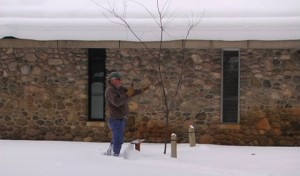To be honest, when you’re making a film, there’s always a period when maybe you’re less than enamored with what you’ve been working on. It’s like anything else you might find yourself doing for a long time.
But I’m lucky because I periodically have new material to become excited about.
Here’s an unedited bit of the interview I did with Robert Darden of the Black Gospel Music Restoration Project. I asked Robert, “Do you consider yourself an archivist?”
An archivist, I’m guessing, and maybe it’s just my own bad interpretation of the term, is somebody who would study this particular disc and glean everything out of it and go do the history. I would like to, but I don’t have the kind of time to do that on anything… What I know about it other people have told me.
The closest thing I can make an analogy to is apparently in Scandinavia, there are underground bunkers and there are scientists who collect seeds. And they have all the different kinds of wheat varieties. And in hermetically sealed, safe conditions, so even if there’s a nuclear holocaust, if there’s another Dutch Elm disease, we can recreate this kind of wheat again. Because if we lost this wheat, then we’ve lost the ability to feed millions. And that seems to be a closer analogy to what I’m doing than to a collector or archivist.
I feel this urgency that we’re in the midst of this, and have been for 50 years, of not valuing this seminal music. To me it has more passion and power than any other musical art form. And if I can do something towards preventing this universal Dutch Elm disease… if I can help stop that by making sure that song has a copy digitally and we have multiple redundancies built into the system, both on and off campus, short of a direct nuclear strike, Baylor will have a copy somewhere of this song. Maybe that’s what I’m doing. I’m saving these seeds, not for the end of the world, but for a time when people will appreciate this music and want to know where that music they love came from and can now take it back to where it came from because somebody at some university thought that this was of value.
I’ve always seen thematic similarities in the work that the four subjects do, and here Robert was handing me a nice metaphor that bridges what he’s doing with what the Champion Tree Project is doing.
But wait! That’s not all. Look at the blog’s header. Do you see that image between the Allen Telescope Array and the Mahalia Jackson album cover? That’s a captured still of David Milarch trekking to visit an old friend, the Buckley Elm in Buckley, Michigan, a one time champion tree that is now dead. Champion Tree Project had the foresight to visit it while it was dying, but still alive, take cuttings, and clone it. Today exact genetic clones of that elm tree are thriving in select locations, including this one at Interlochen Center for the Arts in Interlochen, Michigan.

Should make for a nice edit.

Documentary « Rural Free Delivery
[…] After a lifetime of interviewing other people, sometimes it is a bit unnerving to be interviewed at such length (and depth) yourself. It makes you articulate things about yourself that you’ve never expressed (or even thought about) in public. David was a wonderful, thoughtful interviewer. And, from time to time, while looking for insights, that’s exactly what happened. […]
David Licata
Thank you so much, Robert. This is quite a compliment coming from you and I am very flattered. I might just use your comment on my CV!
And thanks for taking the time to visit the blog and especially for weighing in. It’s exciting when I see a comment on the blog from one of the subjects of the documentary.